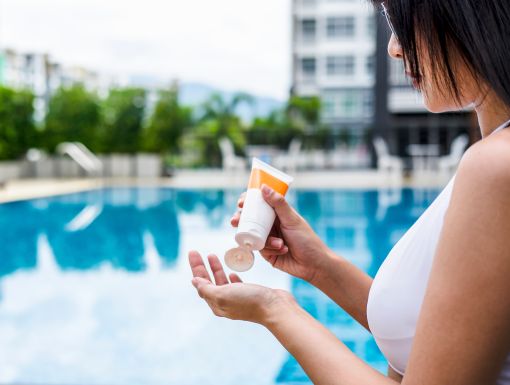
Sun Protection Tips for 2022: 7 Things to Know
To protect your skin from the sun’s ultraviolet (UV) rays, it is important to wear sunscreen daily. The average person tends to wear sunscreen only when planning to spend a lot of time outdoors, but even then, many people wear it incorrectly. Proper application of sunscreen is important because the sun’s ultraviolet (UV) rays can damage skin in as little as 15 minutes, according to the Centers for Disease Control. Here are seven tips to help you make informed decisions about sunscreen.
How To Choose and Apply Sunscreen
- Choose SPF 30 or greater, broad spectrum on the label, and make sure it is water resistant. Mineral-based sunscreens — those with an active ingredient of either zinc oxide or titanium dioxide — are best for children and people with sensitive skin.
- Apply sunscreen generously. Most people don’t apply enough sunscreen. In fact, most only apply about a third of the sunscreen that should be applied to get the benefits from the sun protection formula (SPF). It is recommended to apply it generously and reapply every two hours when outdoors and immediately when you get out of the pool, after swimming, or after sweating. According to the American Academy of Dermatology, most adults need about 1 ounce — or enough to fill a shot glass — to fully cover their body.
- Don’t forget to apply sunscreen to the ears, between the fingers and toes, behind the knees, and the back of the neck and shoulders. Have someone help you with hard-to-reach spots.
- Get a lip balm with SPF 30 or greater and reapply often.
- Wear sunscreen even on cloudy days. It is a common misconception that when it is cloudy or cold, sunscreen is unnecessary. However, clouds don’t filter much of the sun’s ultraviolet radiation (UV rays), so sunscreen is still highly recommended.
- Find a sunscreen that looks and feels good on your skin. We all have different skin types. A lotion, cream, or gel may be better for you. Choose something that feels good to your skin, because you will be more likely to create a habit of wearing it every day.
- Check the sunscreen’s expiration date. Sunscreen without an expiration date has a shelf life of three years. If exposed to high temperatures, the shelf life is shorter.
Keep these tips in mind to help you keep your skin safe not only during the summer months but all year long.
Make a dermatology appointment with Ochsner Health.
Editor's note: This blog was originally published on Aug. 18, 2020, and has since been updated.



